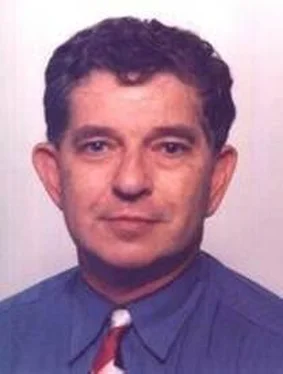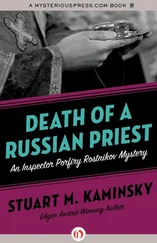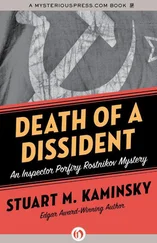The only question was: Were the cops there to keep Marco from getting out, or to keep Stevie or someone else from getting in?
It didn't matter. Stevie knew at least two other ways into the building. He knew that the window to the men's toilet was easy to open. Even if it was locked, the lock was just a small slide bolt he would have no trouble breaking with a firm tug. He wouldn't even make much noise.
The problem with going through the toilet window was that he would have to find something to stand on, get leverage, and then climb through. Usually this would be no problem. But with his leg growing ever more numb, the task might be more than he could handle. Once inside the toilet he would have to go out the door past the bakers and their assistants. He was a familiar sight back there, at least normally. Normally, no one would have paid much, if any, attention to the big man, but today might be altogether different. He doubted that even in his weakened state, bleeding and walking like a mummy in those old movies, that anyone in the bakery would be able to stop him and most would probably simply pretend they had never even noticed him. They had all done time. D and D. Deaf and dumb. It was the stay alive philosophy of prison.
No, it would have to be the storage basement. He didn't know if any of the opaque windows could be opened without making noise that would attract attention. He did know that he wasn't seen by the cop on the loading dock. Window number one was firm, didn't budge, probably hadn't been opened in twenty years or more. Window number two had four sections. The dirty glass plate in the upper right-hand section of the window was loose and the window itself had a little give to it.
Stevie found a small chunk of concrete and knelt by the ground-level window. He tore off a piece of his undershirt, placed it against the loose pane, and struck the cloth with the piece of concrete, struck it gently. There wasn't much noise, but the pane did not give way. He tried again, striking a little harder. Something cracked. There was now a hole in the glass about the size of his fist. He put down the concrete and took the torn piece of shirt from the window.
Stevie inched his thick fingers through the hole in the glass. He felt the cutting of the glass, ignored it and slowly worked the top piece of glass loose. He placed it on the ground.
He wiped his bleeding fingers on his already bloody pants and reached through the open space in the window. There was just enough room for him to force his hand and arm far enough to reach the lock. It was rusted shut, but Stevie was determined. He shoved. The rusted metal bolt came off. Using his right arm, sitting awkwardly, he reached in and put pressure on the window. The window resisted. Slowly Stevie began to feel the window losing the battle. Suddenly, the entire window shot up on creaking hinges.
Stevie knelt panting, waiting, listening for running footsteps, but none came.
He had finished the easy part of his task. Now came the hard part, getting his bulk through the open window. He knew it would be close. He took off his coat and placed it on the ground.
A cold wind drove through him and he realized that snow was falling again. He was growing weaker and he would have to move quickly while he was still able.
He eased his injured leg through the open window followed by his good one and started to push himself backward through the window. When he was inside as far as his stomach, it felt tight, but not impossibly tight. He kept pushing backward. His stomach scraped against the thin metal frame of the window, and he wasn't sure if he would make it through. He was sure at this point that he would never be able to pull himself back out. He struggled, grunting, seeing the blood from his fingers against the snow and then, suddenly, he popped through the window and went sprawling backward into dusty darkness.
He lay on his back panting, out of breath, eyes closed. Big Stevie was in pain. He was cold. And he was bloody. But he was on a mission, and he was inside Marco's Bakery.
* * *
The search perimeter around Drietch's firing range had been widened. Two uniformed officers were helping Aiden search for the missing bolt cutter.
Aiden was sure that Louisa Cormier had simply cut the lock, wiped off her fingerprints, and thrown it on the firing range. Why hadn't she done the same thing with the bolt cutter or dropped it and the lock in the garbage?
They should have found it by now.
Her phone vibrated in her pocket and she answered it.
"Come into the lab," Mac said. "I found the bolt cutter."
"Where?"
"Basement of Louisa Cormier's building," he said. "She had it lined up with other tools. Building maintenance man has a bolt cutter but he said this one isn't it."
"She hid it in plain sight," Aiden said.
"Right out of her fourth novel," Mac said. "Or should I say right out of Charles Lutnikov's first Louisa Cormier novel, only in that one it was a shovel."
"Prints?"
"One," said Mac. "Partial. Good enough for a positive identification. It's Louisa Cormier's."
"I'll be right there," said Aiden, closing her cell phone and going in search of the two uniformed officers who were combing the area.
"I'm on my way to the hospital," he said.
"Right," said Aiden, who wasn't certain how she felt about confronting Louisa Cormier again. Aiden wasn't sure if the woman was cunning and manipulative or if she had simply been caught in a nightmare. Aiden Burn wasn't ready to bet on either.
A WHITE, SAND-PEBBLED BEACH hovered over Stella when she opened her eyes. She could even hear the rhythmic beating of something that may have been surf.
Stella hadn't had a vacation in, what was it, three years. She had never wanted one, had never wanted to get away. There was always a new case or one half finished.
The web of first waking passed in a second or two and she realized that the pebbled beach was the ceiling and the sound of the surf was a monitor whose thin tentacles adhered to her body.
Stella's mouth was dry.
She turned her head and saw Mac standing to her left.
"How…?" she started to say, but it came out as a painful incoherent crackle.
She coughed painfully and pointed at a white plastic pitcher and a glass on the table next to the bed. Mac nodded, poured water, removed the wrapping from a straw, and inserted it in the glass.
"Slow," said Mac, holding the glass for her to drink.
The first sip burned. She had a slight retching sensation, but it passed and she drank some more.
"How bad is it?" she asked.
"You'll be fine," Mac said. "You blacked out. Danny and Hawkes brought you here. Hawkes's friend got you started on glucose and antibiotics. He found an expert on leptospirosis in Honolulu, called him and… here you are."
"How long will I be here?"
"A few days. Then a few days at home," said Mac. "If you'd had a culture when you first started to get sick, you wouldn't have to be here."
"I'm a workaholic," she said with what she hoped was a smile.
Mac returned the smile. Stella looked around the hospital room. There wasn't much to see. A window to her left and one in a corner looked out at a red building across the street. On the wall was the reproduction of a painting she thought she recognized, three women in peasant dresses in a field, stacks of hay behind them. The women were leaning over to pick up something- beans, rice- and drop it in baskets on the ground.
Mac followed her eyes.
"Woman on the right," said Stella. "She's in pain. Look at the deformed C-shaped curve of her back from years of bending. When she stood up, she'd be in pain and bent over. She's not far from being unable to bend like that."
"You want to run some tests on her?" asked Mac.
Читать дальше












